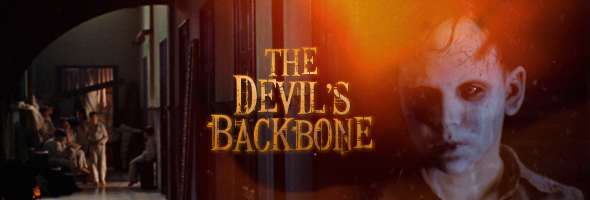

Color, 2001, 106m.
Directed by Guillermo Del Toro
Starring Marisa Paredes, Eduardo Noriega, Federico Luppi, Fernando Tielve, Íñigo Garcés Íñigo Garcés, Irene Visedo
Criterion (Blu-ray & DVD) (US RA/R1 HD/NTSC), Optimum (Blu-ray & DVD) (UK RB/R2 HD/PAL), Cameo (Blu-ray & DVD) (Spain RB/R2 HD/PAL), Sony (DVD) (US R1 NTSC) / WS (1.85:1) (16:9)
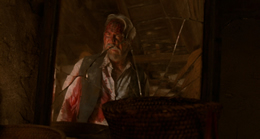
Following the troubled production of the flawed but fascinating Mimic at Miramax, director Guillermo Del
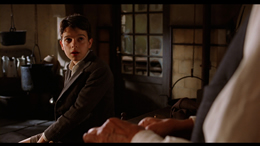 Toro went back to the realm of Spanish-language horror for his third feature, the evocative period film The Devil's Backbone (El espinazo del diablo), which now serves as a sort of centerpiece to a childhood terror trilogy in between his Cronos and Pan's Labyrinth. Here a young boy steps up as the main character in the form of Carlos (Tielve), an orphan during the Spanish Civil War who's left - not by choice - at an orphanage where the unwilling owner, Carmen (Paredes), is already at capacity and supportive of the anti-fascist fighters. A few other adults are also on hand to watch the children, all left under similar circumstances: the aging Dr. Casares (Cronos' Luppi), swarthy but sinister handyman and former student Jacinto (Open Your Eyes' Noriega), and pretty, innocent maid Conchita (Visedo).
Toro went back to the realm of Spanish-language horror for his third feature, the evocative period film The Devil's Backbone (El espinazo del diablo), which now serves as a sort of centerpiece to a childhood terror trilogy in between his Cronos and Pan's Labyrinth. Here a young boy steps up as the main character in the form of Carlos (Tielve), an orphan during the Spanish Civil War who's left - not by choice - at an orphanage where the unwilling owner, Carmen (Paredes), is already at capacity and supportive of the anti-fascist fighters. A few other adults are also on hand to watch the children, all left under similar circumstances: the aging Dr. Casares (Cronos' Luppi), swarthy but sinister handyman and former student Jacinto (Open Your Eyes' Noriega), and pretty, innocent maid Conchita (Visedo). Openly manipulative, Jacinto is romancing both women for different reasons, but Carlos and the boys pay little attention to the drama around them. Instead their focus rests on things like the huge, intimidating bomb transfixed in the middle of their courtyard, which is said to be dismanted but, according to some students, can still be heard ticking. Then there's the matter of Santi, a missing boy whose bed Carlos has now taken; in fact, Carlos begins to see another boy's wounded ghost, surrounded by an aqueous fluid and with blood seeping from his skull, appearing in isolated areas of the school.
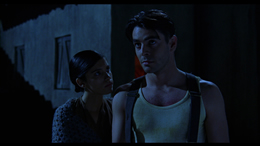
A knowledgeable and respectful movie buff, Del Toro has found treasure in such genres as gothic fantasy, mechanized body horror, and giant monster and robot demolitions. Here, for the first and only time in his career as a director, he turns to the classical ghost story and produces one of his finest films, a deeply affecting mixture of political brutality and spooky tricks culled from the cinematic past ranging from The Innocents and The Other to the still undervalued '60s masterpieces of childhood fear from Carlos Enrique Taboada like The Stone Book and Even the Wind Is Afraid. He also places an admirable emphasis on characters over shock tactics, developing both the adults and children with quick but fine brush strokes that lead to a jolting mid-film incident of violence whose aftermath also evokes more than a hint of Night of the Hunter. That's not to say this film is derivative; it has a mood and a melancholy tone all its own, and the little nods to the rich legacy of horror cinema are simply loving gestures.
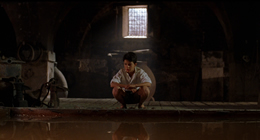
Technically the film still holds up beautifully as well, particularly thanks to the rich, burnished cinematography by Guillermo Navarro and the eerie score by Javier Navarette, both of whom returned for Pan's Labyrinth. The roles of Pedro and Agustín Almodóvar seem appropriate given the casting of the excellent Paredes, who also appeared in All About My Mother and In a Glass Cage among others, but the rest of the cast is pitch perfect as well with Noriega in particular offering another novel twist on his bad boy specialty.
Home video versions of The Devil's Backbone have frequently had difficulty with the film's striking aesthetic, with many scenes playing out in deep darkness or heavy amber lighting. Sony released two different DVDs in the U.S., one essentially bare bones in 2002 and the second a modest special edition with commentary in 2004 (to cash in on Del Toro's Hellboy); both were limited by the constraints of video
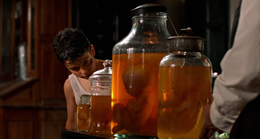 transfer capabilities at the time, often veering into pure bright yellow when the color schemes should have been far more complex. The first Blu-ray in the UK was released in 2011 and was something of a mess, taken from what looked like an HD broadcast master plagued by extreme artificial sharpening and major element damage. A Spanish Blu-ray followed later the same year, sporting a much better transfer (with optional English subtitles) along with a Del Toro interview and storyboard featurette.
transfer capabilities at the time, often veering into pure bright yellow when the color schemes should have been far more complex. The first Blu-ray in the UK was released in 2011 and was something of a mess, taken from what looked like an HD broadcast master plagued by extreme artificial sharpening and major element damage. A Spanish Blu-ray followed later the same year, sporting a much better transfer (with optional English subtitles) along with a Del Toro interview and storyboard featurette. Most likely the final word on the subject and easily the best edition to date is the 2013 revisit from Criterion, available in both Blu-ray and DVD editions. The Blu-ray (with a transfer supervised by Del Toro and Navarro) is absolutely the way to go here as the limitations of NTSC really can't cope with the look of this film. Black levels are back where they should be, deep and thick throughout, with the warm colors popping now where they should and often creating the look of a moving painting. The DTS-HD Master 5.1 audio (with optional English subtitles in a new translation by Del Toro) only really kicks in dramatically where it should (and if you've seen the film, you know exactly where those moments are), and the score sounds appropriately enveloping from the rear speakers. On the extras side, Del Toro's excellent audio commentary (in English) from the second American DVD is ported over here (plus a very quick video intro to the main feature) along with the preexisting video bonus features: "¿Que es un fantasma?," a making-of featurette with the cast and crew interviewed on the set during filming; the storyboard sketch comparison; and a quartet of minor but interesting deleted scenes with Del Toro commentary. Newly produced for this release is a 14-minute interview with historian Sebastian Faber about the Spanish Civil War and its depiction in the film, a Blu-ray only feature spotlighted Del Toro's original conceptual sketches, and two new Del Toro interview featurettes compiled with the older one from the DVD and Spanish Blu-ray, covering pretty much everything you could want to know about the making of the film and its various artistic influences. Polishing it off is a perceptive liner notes essay by British film critic, TV host, and video blogger Mark Kermode, who certainly knows his way around the genre as any fan of The Exorcist already knows. A solid contender for one of the year's best releases.
Buy from Diabolik DVD
Reviewed on August 13, 2013.
![]()